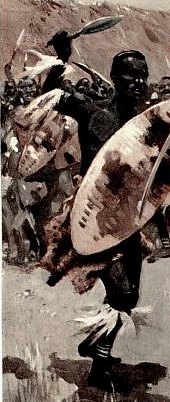
Impi is a Zulu word meaning war or combat and by association any body of men gathered for war, for example impi ya masosha is a term denoting an army. Impi were formed from regiments from amakhanda. In English impi is often used to refer to a Zulu regiment, which is called an ibutho in Zulu or the army.

The Treaty on the Non-Proliferation of Nuclear Weapons, commonly known as the Non-Proliferation Treaty or NPT, is an international treaty whose objective is to prevent the spread of nuclear weapons and weapons technology, to promote cooperation in the peaceful uses of nuclear energy, and to further the goal of achieving nuclear disarmament and general and complete disarmament. Between 1965 and 1968, the treaty was negotiated by the Eighteen Nation Committee on Disarmament, a United Nations-sponsored organization based in Geneva, Switzerland.

Arms trafficking or gunrunning is the illicit trade of contraband small arms and ammunition, which constitutes part of a broad range of illegal activities often associated with transnational criminal organizations. The illegal trade of small arms, unlike other organized crime commodities, is more closely associated with exercising power in communities instead of achieving economic gain. Scholars estimate illegal arms transactions amount to over US$1 billion annually.
Arms control is a term for international restrictions upon the development, production, stockpiling, proliferation and usage of small arms, conventional weapons, and weapons of mass destruction. Arms control is typically exercised through the use of diplomacy which seeks to impose such limitations upon consenting participants through international treaties and agreements, although it may also comprise efforts by a nation or group of nations to enforce limitations upon a non-consenting country.
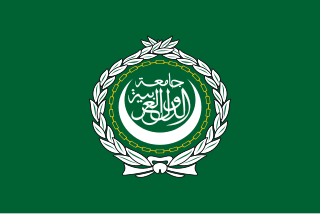
The Arab League, formally the League of Arab States, is a regional organization in the Arab world, which is located in Northern Africa, Western Africa, Eastern Africa, and Western Asia. The Arab League was formed in Cairo on 22 March 1945, initially with six members: Egypt, Iraq, Transjordan, Lebanon, Saudi Arabia, and Syria. Yemen joined as a member on 5 May 1945. Currently, the League has 22 members, but Syria's participation has been suspended since November 2011.

The Horn of Africa (HoA), also known as the Somali Peninsula, is a large peninsula and geopolitical region in East Africa. Located on the easternmost part of the African mainland, it is the fourth largest peninsula in the world. It is composed of Ethiopia, Eritrea, Somalia and Djibouti; broader definitions also include parts or all of Kenya, Sudan, South Sudan, and Uganda. The term Greater Horn Region (GHR) can additionally include Burundi, Rwanda, and Tanzania. It lies along the southern boundary of the Red Sea and extends hundreds of kilometres into the Guardafui Channel, Gulf of Aden, and Indian Ocean and shares a maritime border with the Arabian Peninsula of Western Asia.
The FAL, is a battle rifle designed in Belgium by Dieudonné Saive and manufactured by FN Herstal.
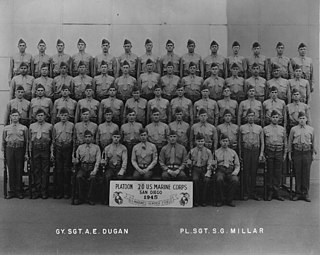
A platoon is a military unit typically composed of two or more squads, sections, or patrols. Platoon organization varies depending on the country and the branch, but a platoon can be composed of 50 people, although specific platoons may range from 10 to 100 people. A platoon is typically the smallest military unit led by a commissioned officer. The platoon leader is usually a junior officer—a second or first lieutenant or an equivalent rank. The officer is usually assisted by a platoon sergeant.
The small arms trade is the markets of both authorized and illicit small arms and light weapons (SALW), as well as their parts, accessories, and ammunition.

A rhinoceros, commonly abbreviated to rhino, is a member of any of the five extant species of odd-toed ungulates in the family Rhinocerotidae. Two of the extant species are native to Africa, and three to South and Southeast Asia.

Jeremy Graham Horn is an American mixed martial artist. Horn is best known for fighting in smaller American promotions, he has also competed in some of the premiere mixed martial arts organizations around the world, including the UFC, WEC, PRIDE, Bellator, Pancrase, the IFL, King of the Cage, and the International Fighting Championships (IFC). Horn is the former King of the Cage Light Heavyweight Champion and has also competed in the Heavyweight and Light Heavyweight divisions. He holds notable victories over Chuck Liddell, Forrest Griffin, Chael Sonnen (x3), and David Loiseau.
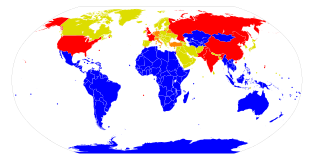
A nuclear-weapon-free zone (NWFZ) is defined by the United Nations as an agreement that a group of states has freely established by treaty or convention that bans the development, manufacturing, control, possession, testing, stationing or transporting of nuclear weapons in a given area, that has mechanisms of verification and control to enforce its obligations, and that is recognized as such by the General Assembly of the United Nations. NWFZs have a similar purpose to, but are distinct from, the Treaty on the Non-Proliferation of Nuclear Weapons to which most countries including five nuclear weapons states are a party. Another term, nuclear-free zone, often means an area that has banned both nuclear power and nuclear weapons, and sometimes nuclear waste and nuclear propulsion, and usually does not mean a UN-acknowledged international treaty.
The Poly Technologies, sometimes abbreviated as PolyTech, a subsidiary of China Poly Group Corporation, is a trade company with headquarters in Beijing, China. The company deals with missiles and other military products. The company was founded by the Chinese People's Liberation Army in order to provide competition to China North Industries Corporation (Norinco). The company is one of China's largest arms exporters and has been sanctioned by the United States.

Small Arms and Light Weapons (SALW) refers in arms control protocols to two main classes of man-portable weapons.
The Safari Club was a covert alliance of intelligence services formed in 1976 that ran clandestine operations around Africa at a time when the United States Congress had limited the power of the CIA after years of abuses and when Portugal was withdrawing from Africa. Its formal members were the pre-revolution (Pahlavi) Iran, Egypt, Saudi Arabia, Morocco and France. The group maintained informal connections with the United States, South Africa, Rhodesia and Israel. The group executed a successful military intervention in Zaire in response to an invasion from Angola. It also provided arms to Somalia in its 1977–1978 conflict with Ethiopia. It organized secret diplomacy relating to anti-Communism in Africa, and has been credited with initiating the process resulting in the 1979 Egypt–Israel peace treaty.

The RPD is a 7.62x39mm light machine gun developed in the Soviet Union by Vasily Degtyaryov for the 7.62×39mm M43 intermediate cartridge. It was created as a replacement for the DP machine gun chambered for the 7.62×54mmR round. It is a precursor of most squad automatic weapons. It was succeeded in Soviet service by the RPK.

The UN Office for Disarmament Affairs (UNODA) is an Office of the United Nations Secretariat established in January 1998 as the Department for Disarmament Affairs, part of United Nations Secretary-General Kofi Annan's plan to reform the UN as presented in his report to the General Assembly in July 1997.
The 1982 Ethiopian–Somali Border War occurred between June and August 1982 when Ethiopia, sending a 10,000 man invasion force backed by warplanes and armored units, supported by thousands of SSDF rebels invaded Central Somalia. The United States government responded by speeding up deliveries of light arms and Pattons already promised. In addition, the initially pledged US$45 million in economic and military aid was increased to US$80 million.

United Nations Security Council resolution 1467, adopted unanimously on 18 March 2003, after expressing concern at the situation in West Africa, the Council adopted a declaration regarding the proliferation of weapons and mercenary activities in West Africa.
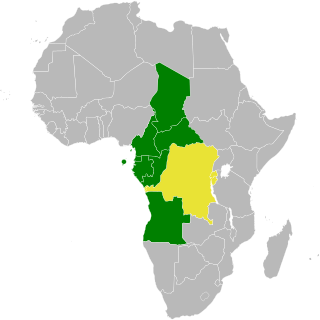
The Central African Convention for the Control of Small Arms and Light Weapons, their Ammunition and all Parts and Components that can be used for their Manufacture, Repair and Assembly, also known as the Kinshasa Convention, aims at regulating small arms and light weapons (SALW) and combating their illicit trade and trafficking in Central Africa.













